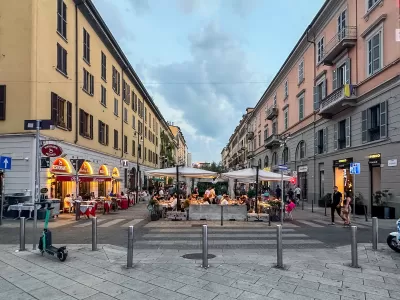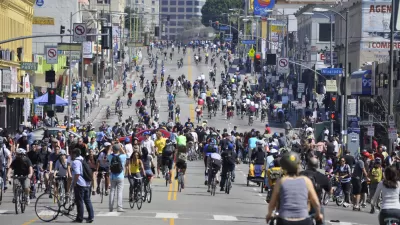The Covid era highlighted social inequities and prompted new paradigms for urbanism and mobility. Will they stick around?

How will urban design and mobility change in the post-COVID city? Scott Shepard shares his thoughts, noting that “After the initial shock and subsequent waves [of the pandemic], a new way of thinking began to quickly take hold.”
Cities around the country and the world began looking for ways to reverse decades- and centuries-old urban design paradigms, spurred both by changes wrought by the pandemic and by the threats of climate change. “This, along with public policies and investments in shared and active modes and a decarbonization of the transport sector collectively pointed towards a brighter future, and one decoupled from the 20th century modernist, car centric urban paradigm.”
Shepard sees promise in the reorganization of society forced by the pandemic and the changes that are persisting as the pandemic winds down. “Much is still needed to be done to help promote and develop in this manner, such as the 15 Minute City and new initiatives to help people take back control of public spaces from the automobile through tactical urbanism and DIY projects. However, this unprecedented era we live in is cause for celebration of our cities, and the potential they bring to a better quality of life for all groups and communities.”
FULL STORY: Urbanism & Mobility in the Post-COVID City

Planetizen Federal Action Tracker
A weekly monitor of how Trump’s orders and actions are impacting planners and planning in America.

Congressman Proposes Bill to Rename DC Metro “Trump Train”
The Make Autorail Great Again Act would withhold federal funding to the system until the Washington Metropolitan Area Transit Authority (WMATA), rebrands as the Washington Metropolitan Authority for Greater Access (WMAGA).

The Simple Legislative Tool Transforming Vacant Downtowns
In California, Michigan and Georgia, an easy win is bringing dollars — and delight — back to city centers.

The States Losing Rural Delivery Rooms at an Alarming Pace
In some states, as few as 9% of rural hospitals still deliver babies. As a result, rising pre-term births, no adequate pre-term care and "harrowing" close calls are a growing reality.

The Small South Asian Republic Going all in on EVs
Thanks to one simple policy change less than five years ago, 65% of new cars in this Himalayan country are now electric.

DC Backpedals on Bike Lane Protection, Swaps Barriers for Paint
Citing aesthetic concerns, the city is removing the concrete barriers and flexposts that once separated Arizona Avenue cyclists from motor vehicles.
Urban Design for Planners 1: Software Tools
This six-course series explores essential urban design concepts using open source software and equips planners with the tools they need to participate fully in the urban design process.
Planning for Universal Design
Learn the tools for implementing Universal Design in planning regulations.
Smith Gee Studio
City of Charlotte
City of Camden Redevelopment Agency
City of Astoria
Transportation Research & Education Center (TREC) at Portland State University
US High Speed Rail Association
City of Camden Redevelopment Agency
Municipality of Princeton (NJ)



























